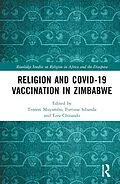This book analyses the role of religion during the COVID- 19 pandemic and vaccination rollout in Zimbabwe.
Zimbabwe was listed by the World Health Organization (WHO) as one of thirteen African countries to have fully vaccinated more than 10% of its population against COVID- 19 by the end of September 2021, but the country fell far short of the government's own target for achieving 60% inoculation by December 2020. This book analyses whether religion played a role in explaining why the government's pro- vaccine stance did not translate into high vaccination rates. Drawing upon various religions, including African indigenous religions, Christianity and Islam, the book considers how faith actors demonstrated vaccine acceptance, resistance or hesitancy. Zimbabwe offers a particularly interesting and varied case for analysis, and the original research on display here will be an important contribution to wider debates on religion and COVID- 19. This book will be useful to academics, researchers and students studying religious studies, sociology, health and well- being, religion and development.
Autorentext
Tenson Muyambo earned a PhD from the University of KwaZulu Natal
(UKZN), South Africa. He is a research fellow at the University of South
Africa's (UNISA) Research Institute for Theology and Religion (RITR),
College of Human Sciences. He lectures at the Great Zimbabwe University,
and researches and publishes extensively on indigenous knowledge systems,
religion (Ndau indigenous religion), gender, education, pandemics and
African Spirituality. He has co- edited the books, Religion and the COVID- 19
Pandemic in Southern Africa (2022) and Re- imagining Indigenous Knowledge
and Practices in 21st Century Africa: Debunking Myths and Misconceptions
for Conviviality and Sustainability (2022).
Fortune Sibanda (PhD) is a professor of Religious Studies in the Department of
Philosophy and Religious Studies, Great Zimbabwe University, Masvingo
and Department of Theology and Religious Studies, University of Eswatini,
Eswatini. Professor Sibanda is also a research fellow in the Research
Institute for Theology and Religion, UNISA, South Africa. He is a specialist
in the History and Phenomenology of Religion; African Indigenous
Religions and New Religious Movements (particularly Rastafari). His
research interests include Indigenous Knowledge Systems, religion and
health, religion and the environment, human rights issues, law and religion,
religion and the culinary arts tackled from an African perspective. Sibanda
has published edited books, book chapters and his work has also appeared
in refereed journals. He is a member of a number of academic associations,
including the American Academy of Religion (AAR), African Consortium
for Law and Religion Studies (ACLARS), African Theological Institutions
in Southern and Central Africa (ATISCA), Association for the Study of
Religion in Southern Africa (ASRSA) and African Association for the
Study of Religion (AASR). Professor Sibanda is a member of the ACLARS
Publication Committee and ACLARS Board member.
Ezra Chitando (DPhil) is a professor of History and Phenomenology of
Religion at the University of Zimbabwe. His broad research and publication
interests include method and theory in the study of religion, as well as
religion, health, gender, security, politics, development, climate change, and
sexuality, among others.
